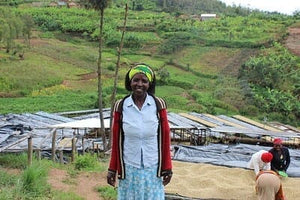by Susan Heller Evenson, Atlas Importers
Abateraninkunga ba Sholi (“Sholi”) Cooperative, meaning “Mutual Assistance,” is located in Muhanga district, Southern Province, in the center of Rwanda, about halfway between Kigali and Lake Kivu. Established in 2008, Sholi has been producing coffee for nearly a decade, and the Cooperative’s name speaks to its members working together to improve both their coffee and the greater community. Sholi was born out of a women’s association called “Kundwa”, which means “love”in Kinyarwanda. Today, nearly half of Sholi’s members are women, including two of the five board members. In addition to coffee trees at the farm level (which average ~410 per female member), the women’s association has two communal plots for harvesting and producing coffee. The first site has 2,356 trees, and the second 3,960 trees (as of Feb 2021).
In 2016, Sholi received a grant to build both a community center and a regional health center to serve members and residents. During a visit in 2018, we visited the regional health center and met with several of the staff members to learn about the invaluable services they offer to the remote surrounding area. With the nearest larger health facility being over 18 km away on poor roads, the blood tests and treatment they can provide for malaria, parasites, respiratory infection, and basic first aid. Betty, the head nurse, along with the other four staff members, are hoping to run a nutrition and cooking program to combat early childhood
(< 5 years old) malnutrition, as well as working out some public-health partnerships with other clinics in the region.
With over 400,000 trees already planted, Sholi has continued to invest in its long-term agriculture, planting 18,000 trees in 2016 and 30,000 additional trees by the end of 2017. Coffee processing at Sholi is similar to other coffee cooperatives in Rwanda, although each has its minor variations. After coffee cherries are delivered to the washing station, the coffee is pulped. The lower grades (A3 and A4) are dried and sold to the local market. The two higher grades (A1 and A2) are dry-fermented for 12-18 hours, depending on the climate, then soaked. After soaking the wet parchment is hand-picked on covered raised beds for 24 hours (“pre drying”) before being moved to the drying beds, where they dry over 21-25 days depending on the weather.
For natural process coffees, Sholi selects and identifies the highest-quality cherries that arrive at the central washing station. The cherries are sorted again, floated, and moved to the drying tables. After three or four days, they cover the dried cherries for 24-30 hours to develop the flavor. The cherries are monitored and continue to dry up to 30-35 days depending on the weather.
The Cooperative received its Fairtrade certification in 2015 and Rainforest Alliance certification in 2016, and Organic certification in 2020. Using Fairtrade funds, members have started an apiary project as well as distributed cows to members. In 2017, Atlas imported Sholi’s inaugural shipment to the U.S.
Sholi coffees have some of the deepest citrus acidity we’ve seen from the great lakes countries, shining with ruby red grapefruit and juicy blood orange. Additional layers of mango, orange, and dark berry are balanced by honey and finish with lavender. We’re excited to bring Sholi coffee into our family of offerings from Rwanda, and we hope you enjoy it as well!

